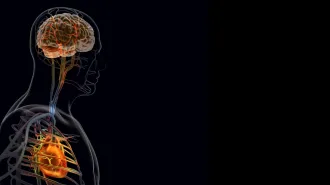Boosting a liver protein may mimic the brain benefits of exercise
Liver-made proteins that circulate in the blood improved memories, a mouse study suggests

A protein produced by the liver in response to regular exercise may help explain how regular workouts can help the brain, even as we age.
kali9/E+/Getty Images Plus
Exercise’s power to boost the brain might require a little help from the liver.
A chemical signal from the liver, triggered by exercise, helps elderly mice keep their brains sharp, suggests a study published in the July 10 Science. Understanding this liver-to-brain signal may help scientists develop a drug that benefits the brain the way exercise does.
Lots of studies have shown that exercise helps the brain, buffering the memory declines that come with old age, for instance. Scientists have long sought an “exercise pill” that could be useful for elderly people too frail to work out or for whom exercise is otherwise risky. “Can we somehow get people who can’t exercise to have the same benefits?” asks Saul Villeda, a neuroscientist at the University of California, San Francisco.
Villeda and colleagues took an approach similar to experiments that revealed the rejuvenating effects of blood from young mice (SN: 5/5/14). But instead of youthfulness, the researchers focused on fitness. The researchers injected sedentary elderly mice with plasma from elderly mice that had voluntarily run on wheels over the course of six weeks. After eight injections over 24 days, the sedentary elderly mice performed better on memory tasks, such as remembering where a hidden platform was in a pool of water, than elderly mice that received injections from sedentary mice.
Comparing the plasma of exercised mice with that of sedentary mice showed an abundance of proteins produced by the liver in mice that ran on wheels.
The researchers closely studied one of these liver proteins produced in response to exercise, called GPLD1. GPLD1 is an enzyme, a type of molecular scissors. It snips other proteins off the outsides of cells, releasing those proteins to go do other jobs. Targeting these biological jobs with a molecule that behaves like GPLD1 might be a way to mimic the brain benefits of exercise, the researchers suspect.
Old mice that were genetically engineered to make more GPLD1 in their livers performed better on the memory tasks than other old sedentary mice, the researchers found. The genetically engineered sedentary mice did about as well in the pool of water as the mice that exercised. “Getting the liver to produce this one enzyme can actually recapitulate all these beneficial effects we see in the brain with exercise,” Villeda says.
Blood samples from elderly people also hint that exercise raises GPLD1 levels. Elderly people who were physically active (defined as walking more than 7,100 steps a day) had more of the protein than elderly people who were more sedentary, data on step-counters showed.
GPLD1 seems to exert its effects from outside of the brain, perhaps by changing the composition of the blood in some way, the researchers suspect.
But the role of GPLD1 is far from settled, cautions Irina Conboy, a researcher at the University of California, Berkeley who studies aging. There’s evidence that GPLD1 levels are higher in people with diabetes, she points out, hinting that the protein may have negative effects. And different experiments suggest that GPLD1 levels might actually fall in response to certain kinds of exercise in rats with markers of diabetes.
“We know for sure that exercise is good for you,” Conboy says. “And we know that this protein is present in the blood.” But whether GPLD1 is good or bad, or whether it goes up or down with exercise, she says, “we don’t know yet.”







